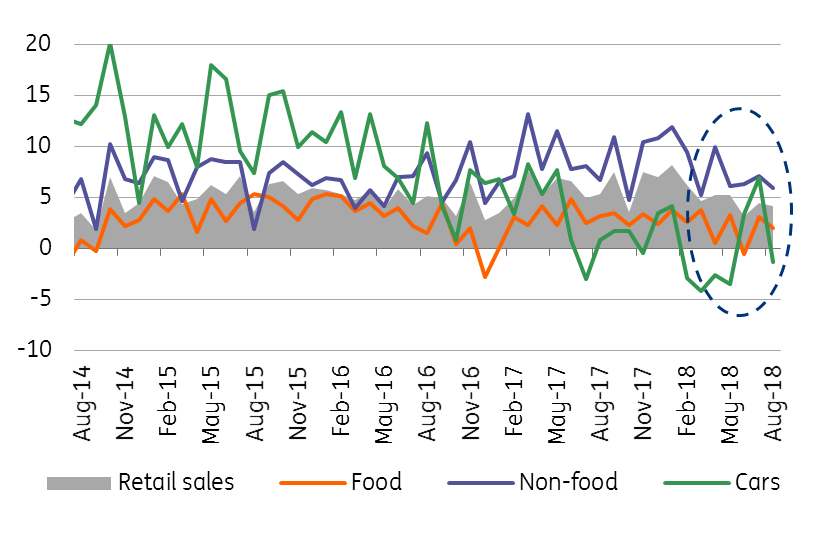The holiday effect in Czech Republic
Today's set of numbers sound slightly mixed as industrial growth and retail disappoint, which may be the effect of the holiday months
Industrial production affected by the holiday effect
Industrial production slowed down to 1.9% in August, below the year to date average growth of 3.5% year on year. In July, the strong growth of 10.3% was driven partly due to calendar effects (one more working day) and a lower base due to shutdowns at the Dukovany nuclear plant last year. But the above average annual growth in the manufacturing industry in July suggested that differently distributed company holidays also had their role.
On the contrary, this effect would push the year-on-year dynamics below in August. Therefore, the lower value of August's industrial production is not necessary to overestimate. The domestic industry could grow around 3% this year, which would still be a positive value in the context of recent figures and uncertainties surrounding the escalation of trade wars.
| 1.9% YoY |
Industrial growth in AugustImpacted most likely by company holidays |
| Worse than expected | |
Retail sales also slightly weaker
Retail sales (excluding cars) grew by 4.2% year on year in August. This figure ended slightly below market expectations (4.5%) and is also below the average year to date growth of 5.2% YoY. However, like in the case of industrial production, there might be a chance that the annual print is to some extent influenced by the different distribution of vacancies abroad compared to the previous year. Therefore, there is no need to overestimate the slightly lower retail sales dynamics during the summer months.
Car sales impacted by new emission limits rules
Also, motor vehicle sales fell by 1.3% YoY after double-digit growth in July. Car sales are becoming weaker this year, but the market expected higher growth in August, as the start of tighter emission limits in September led to a frontloading and a surge in sales in many countries abroad in August. In the domestic economy, however, this frontloading effect didn't occur, probably only slightly in July.
Preliminary data shows that the new emission limits leading to late delivery of new cars has caused a significant drop in registrations of new cars in September, up to half, so the car sales next month will deteriorate significantly.
Retail sales (working days adjusted, % YoY)

Unemployment rate declined
The share of unemployed people declined in September to 3.0%, which is the effect of typical seasonality after the end of the holiday months. The unemployment rate is likely to fall below the 3% level again in October and November when it could reach 2.8%, which would represent a new historical minimum.
However, the labour market is already heavily overheated, and companies are having problems finding suitable candidates, so the room for a further drop in unemployment is rather limited.
Download
Download snap